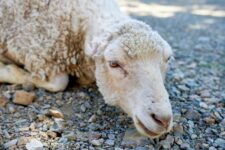
‘At points it’s felt like a nightmare’
As temperatures rise worldwide, our animal friends feel the heat, and some struggle to survive. From household pets to wild creatures, all species feel the effects of our warming planet.
What’s happening?
Heatwaves are becoming more frequent and intense, putting animals at risk.
An article from the Guardian profiled a few special animals who have died prematurely due to rising temperatures. Particularly striking was the case of Solly, a rescued lamb who tragically died on a 104-degree Fahrenheit day in Spain, choking as temperatures soared.
Nicole Eden, Solly’s caretaker who runs an animal sanctuary, shared her heart-wrenching memory of Solly’s last day with the Guardian: “That sequence of memories I have from digging Solly’s grave, that’s one of the recurring images I get … At points it’s felt like a nightmare.”
Other continents experience more of the same, according to the Guardian. Australian firefighters report finding bodies of kangaroos and emus in the aftermath of devastating bushfires. Even underwater, coral reefs are suffering, with up to 90% at risk of being lost if global temperatures rise by 2.7 degrees Fahrenheit.
Why are animal deaths due to heat stroke concerning?
These stories aren’t just heartbreaking. They’re warning signs of a larger problem.
As our planet warms, animals face numerous challenges. Pets can suffer heatstroke or burn their paws on hot pavement. Meanwhile, wildlife habitats are being destroyed by fires and extreme weather, hurting wild animals, our food supply, and the delicate balance of ecosystems we rely on.
While these issues are serious, they’re not unsolvable. By reducing our carbon impact, we can create a safer, cooler world for all living creatures to enjoy, including ourselves.
What can I do to stop animal deaths due to heatstroke?
Many of the steps we can take to protect animals also benefit our wallets and well-being.
Reduce your energy use at home by using a smart thermostat or switching to LED bulbs. This will cut your bills and carbon pollution.
Choose plant-based meals more often. It’s good for your health and helps reduce the environmental impact of animal agriculture.
Support wildlife-friendly gardening practices. Plant native species and avoid pesticides to create safe havens for local critters.
Finally, don’t be afraid to use your voice. Advocate for policies that preserve natural habitats and reduce planet-warming gas pollution in your community.
Join our free newsletter for good news and useful tips, and don’t miss this cool list of easy ways to help yourself while helping the planet.



